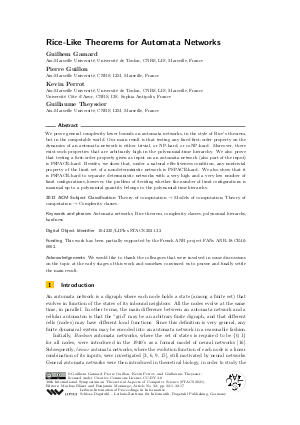Rice-Like Theorems for Automata Networks
Authors Guilhem Gamard, Pierre Guillon, Kevin Perrot, Guillaume Theyssier
-
Part of:
Volume:
38th International Symposium on Theoretical Aspects of Computer Science (STACS 2021)
Part of: Series: Leibniz International Proceedings in Informatics (LIPIcs)
Part of: Conference: Symposium on Theoretical Aspects of Computer Science (STACS) - License:
 Creative Commons Attribution 4.0 International license
Creative Commons Attribution 4.0 International license
- Publication Date: 2021-03-10
File

PDF
LIPIcs.STACS.2021.32.pdf
- Filesize: 0.71 MB
- 17 pages
Document Identifiers
Subject Classification
ACM Subject Classification
- Theory of computation → Models of computation
- Theory of computation → Complexity classes
Keywords
- Automata networks
- Rice theorem
- complexity classes
- polynomial hierarchy
- hardness
Metrics
- Access Statistics
-
Total Accesses (updated on a weekly basis)
0PDF Downloads0Metadata Views
Abstract
We prove general complexity lower bounds on automata networks, in the style of Rice’s theorem, but in the computable world. Our main result is that testing any fixed first-order property on the dynamics of an automata network is either trivial, or NP-hard, or coNP-hard. Moreover, there exist such properties that are arbitrarily high in the polynomial-time hierarchy. We also prove that testing a first-order property given as input on an automata network (also part of the input) is PSPACE-hard. Besides, we show that, under a natural effectiveness condition, any nontrivial property of the limit set of a nondeterministic network is PSPACE-hard. We also show that it is PSPACE-hard to separate deterministic networks with a very high and a very low number of limit configurations; however, the problem of deciding whether the number of limit configurations is maximal up to a polynomial quantity belongs to the polynomial-time hierarchy.
Cite As Get BibTex
Guilhem Gamard, Pierre Guillon, Kevin Perrot, and Guillaume Theyssier. Rice-Like Theorems for Automata Networks. In 38th International Symposium on Theoretical Aspects of Computer Science (STACS 2021). Leibniz International Proceedings in Informatics (LIPIcs), Volume 187, pp. 32:1-32:17, Schloss Dagstuhl – Leibniz-Zentrum für Informatik (2021)
https://doi.org/10.4230/LIPIcs.STACS.2021.32
BibTex
@InProceedings{gamard_et_al:LIPIcs.STACS.2021.32,
author = {Gamard, Guilhem and Guillon, Pierre and Perrot, Kevin and Theyssier, Guillaume},
title = {{Rice-Like Theorems for Automata Networks}},
booktitle = {38th International Symposium on Theoretical Aspects of Computer Science (STACS 2021)},
pages = {32:1--32:17},
series = {Leibniz International Proceedings in Informatics (LIPIcs)},
ISBN = {978-3-95977-180-1},
ISSN = {1868-8969},
year = {2021},
volume = {187},
editor = {Bl\"{a}ser, Markus and Monmege, Benjamin},
publisher = {Schloss Dagstuhl -- Leibniz-Zentrum f{\"u}r Informatik},
address = {Dagstuhl, Germany},
URL = {https://drops.dagstuhl.de/entities/document/10.4230/LIPIcs.STACS.2021.32},
URN = {urn:nbn:de:0030-drops-136770},
doi = {10.4230/LIPIcs.STACS.2021.32},
annote = {Keywords: Automata networks, Rice theorem, complexity classes, polynomial hierarchy, hardness}
}
Author Details
- Aix-Marseille Université, Université de Toulon, CNRS, LIS, Marseille, France
- Université Côte d'Azur, CNRS, I3S, Sophia Antipolis, France
Funding
This work has been partially supported by the French ANR project FANs ANR-18-CE40-0002.
Acknowledgements
We would like to thank the colleagues that were involved in some discussions on the topic at the early stages of this work and somehow convinced us to pursue and finally settle the main result.
References
-
J. Aracena. Maximum number of fixed points in regulatory Boolean networks. Bull. Math. Biol., 70:1398-1409, 2008.

- B. Borchert and F. Stephan. Looking for an analogue of Rice’s theorem in circuit complexity theory. Mathematical Logic Quarterly, 46(4):489-504, 2000. URL: https://doi.org/10.1002/1521-3870(200010)46:4<489::AID-MALQ489>3.0.CO;2-F.
-
P. Cull. Linear analysis of switching nets. Biol. Cybernet., 8:31-39, 1971.

-
J. Demongeot, M. Noual, and S. Sené. Combinatorics of Boolean automata circuits dynamics. Discr. Appl. Math., 160:398-415, 2012.

- H.-D. Ebbinghaus and J. Flüm. Finite Model Theory. Springer-Verlag, 2nd edition, 1995. URL: https://doi.org/10.1007/3-540-28788-4.
-
B. Elspas. The theory of autonomous linear sequential networks. IRE Trans. Circ. Theory, 6:45-60, 1959.

-
C. Espinosa-Soto, P. Padilla-Longoria, and E. R. Alvarez-Buylla. A gene regulatory network model for cell-fate determination during Arabidopsis thaliana flower development that is robust and recovers experimental gene expression profiles. The Plant Cell, 16:2923-2939, 2004.

-
E. Goles and S. Martinez. Neural and Automata Networks: Dynamical Behavior and Applications. Kluwer Academic Publishers, 1990.

-
S. W. Golomb. Shift Register Sequences. Holden-Day Inc., 1967.

- W. Hanf. Model-theoretic methods in the study of elementary logic. In J.W. Addison, L. Henkin, and A. Tarski, editors, The Theory of Models, pages 132-145. North-Holland, 1963. URL: https://doi.org/10.1016/B978-0-7204-2233-7.50020-4.
- N. Immerman. Descriptive Complexity. Springer-Verlag, 1999. URL: https://doi.org/10.1007/978-1-4612-0539-5.
-
J. Kari. Rice’s theorem for the limit sets of cellular automata. Theoretical Computer Science, 127:229-254, 1994.

-
G. Karlebach and R. Shamir. Modelling and analysis of gene regulatory networks. Nature Rev. Mol. Cell Biol., 9:770-780, 2008.

- S. A. Kauffman. Metabolic stability and epigenesis in randomly constructed genetic nets. Journal of Theoretical Biology, 22:437-467, 1969. URL: https://doi.org/10.1016/0022-5193(69)90015-0.
-
S. C. Kleene. Automata Studies, chapter Representation of events in nerve nets and finite automata, pages 3-41. Princeton University Press, 1956.

-
W. S. McCulloch and W. H. Pitts. A logical calculus of the ideas immanent in nervous activity. Bull. Math. Biophys., 5:115-133, 1943.

-
L. Mendoza and E. R. Alvarez-Buylla. Dynamics of the genetic regulatory network for Arabidopsis thaliana flower morphogenesis. J. Theoret. Biol., 193:307-319, 1998.

- H. G. Rice. Classes of recursively enumerable sets and their decision problems. Transactions of the American Mathematical Society, 74:358-366, 1953. URL: https://doi.org/10.1090/S0002-9947-1953-0053041-6.
-
A. Richard. Local negative circuits and fixed points in non-expansive Boolean networks. Discr. Appl. Math., 159:1085-1093, 2011.

-
F. Robert. Discrete Iterations: A Metric Study. Springer Verlag, 1986.

-
J. H. Silverman. A friendly introduction to number theory. Pearson Education, 4th edition, 2012.

- L. J. Stockmeyer and A. R. Meyer. Word problems requiring exponential time(preliminary report). In Proceedings of the Fifth Annual ACM Symposium on Theory of Computing, STOC '73, pages 1-9, New York, NY, USA, 1973. ACM. URL: https://doi.org/10.1145/800125.804029.
-
D. Thieffry and R. Thomas. Dynamical behaviour of biological regulatory networks - II. Immunity control in bacteriophage lambda. Bull. Math. Biol., 57:277-297, 1995.

- R. Thomas. Boolean formalization of genetic control circuits. Journal of Theoretical Biology, 42:563-585, 1973. URL: https://doi.org/10.1016/0022-5193(73)90247-6.
